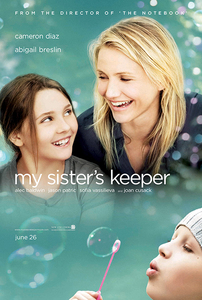
Movies
Reviews

Review: My Sister's Keeper
Filed under: Reviews
A film like My Sister's Keeper is so difficult to review from a critical standpoint: it's not a film that loses itself in melodrama but rather a film that shamelessly aspires to be just that. Fans of director Nick Cassavetes' 2004 tearjerker, The Notebook, can look forward to another overdose of sentimentality and a full two hours worth of waterworks -- expect one's eyes to mist over almost immediately, soon escalating into a steady trickle of tears and, at last, culminating in several minutes of outright sobbing during the grand finale.
It's hard to believe that Nick is the son of John Cassavetes, whose challenging films defied Hollywood conventions and showcased some of the most complex performances ever recorded on celluloid. Unlike his father, Cassavetes the Younger makes films so slavish in their devotion to Hollywood conventions and populated by such one-dimensional characters, one might interpret it as an act of familial rebellion. My Sister's Keeper is no exception -- it's basically a high profile Lifetime movie-of-the-week.
Like The Notebook, the director once again finds his source material in the dregs of contemporary fiction -- the variety of paperback novels that line the racks of supermarkets and airport bookstores. The film adapts Jodie Picoult's bestselling novel of the same name. My Sister's Keeper is the story of a young girl, Anna Fitzgerald (Abigail Breslin), who was conceived to serve as a donor to her leukemia stricken sister. At age eleven she sues her parents for "medical emancipation" when they attempt to coerce her into donating a kidney to her sister who, after years of fighting cancer, is going into renal failure. At least that's what the film appears to be about for the first forty-five minutes. Suddenly, the court case drama slinks into the shadows and another story emerges in the forefront -- ailing sister Kate (Sofia Vassilieva) comes to terms with death while her mother Sara (Cameron Diaz) frantically tries to keep her alive. The two stories could easily coexist but the transition is awkward. So far does the initial conflict recede into the background that two thirds of the way though you'll be asking, "So what ever happened with that lawsuit thing?"
However, all is explained in what has to be one of the worst endings imaginable. In the final act, the focus returns to the legal drama. During the trial, which boasts all the decorum of an episode of Judge Judy, it's revealed that Kate convinced Anna to sue their parents so she could die. In one fell swoop the film is stripped of all potentially intriguing moral ambiguity. Now we understand why the film drifted from the central conflict -- because there never really was a conflict to begin with. Anna did not make the difficult decision to deny her sister a vital organ because it would diminish her own quality of life and life expectancy. No, Kate made the decision for her. It's amazing -- a whole family made up of altruists. The only remotely selfish character of the bunch is Sara, whose sole crime is fighting to keep her daughter alive against her will.
The actors' performances are adequate but bland. Diaz's role could have been meaty -- she plays a mother-of-the-year type whose myopic focus on keeping her eldest daughter alive, at times, causes her to lose all perspective. However, Diaz does little other than whine, bitch and sulk her way through the torrid script. Young actress, Vassilieva imbues Kate with the dignified courage people like to imagine the terminally ill have as the end approaches but fails to give the character an inkling of nuance. While individuals battling a fatal disease often eventually find peace, the road to acceptance is fraught with anger, fear and bitterness. The only character of real interest is Jesse (Evan Ellingson), the eldest of the Fitzgerald children. As neither diseased not donor he is perpetually cast aside (to such a point that his parents didn't figure out he was dyslexic until he'd struggled through many years of school.) Ellingson plays Jesse with a subtle balance of anger, frustration, sadness and vulnerability creating the only relatable character of the film.
In the end, My Sister's Keeper is the kind of film that appeals to a specific demographic who will forgive its many faults -- you know who you are. It's basically a gloomy popcorn flick -- with as little edge as its perpetual soft golden-hued lighting would suggest.
Tags: Cameron Diaz, Abigail Breslin, Alec Baldwin, Joan Cusack, Jason Patric, Sofia Vassilieva, Evan Ellingson, Thomas Dekker, Nick Cassavetes, Jodie Picoult
Related Posts
- Review: Maggie
- Review: Ender's Game
- The Guardians rise in Vancouver
- 30 Rock: The Fabien Strategy
- The Crafty Monkey Awards: Our Best in Television for 2009/2010






Original Comments Posted (3)
ariana says...
So far does the initial conflict recede into the background that two thirds of the way though you’ll be asking, “So what ever happened with that lawsuit thing?”
You know, even the trailer had that effect on me! Thanks for satisfying my curiosity about this--now I know I don't need to see it. (I would be interested in your take on what I consider to be Nick Cassavetes' only interesting piece thus far, Alpha Dog.)
Jun 26, 2009 1:56pm
Elizabeth Hughes Belzil says...
Hey Ariana,
Thanks for your comment! I'm embarrassed to say I haven't actaully seen Alpha Dog--I was curious to when it initially came out in theaters but never got around to it and sort of forgot about it. . . It certainly seemed out of character for Cassavetes. I will have to make a point to see it and let you know!
Jun 27, 2009 12:15pm
DanielleMcGaw says...
I'm not ashamed to say that I am the specific demographic that this movie is hitting for and I will likely rent it on a night I am alone and can cry my way through it. One of my dirty little secrets - I love bad movies. :) But I think the book will be better and I'll likely read that first. Thanks for the review.
Jul 11, 2009 8:19pm
Comments Posted (